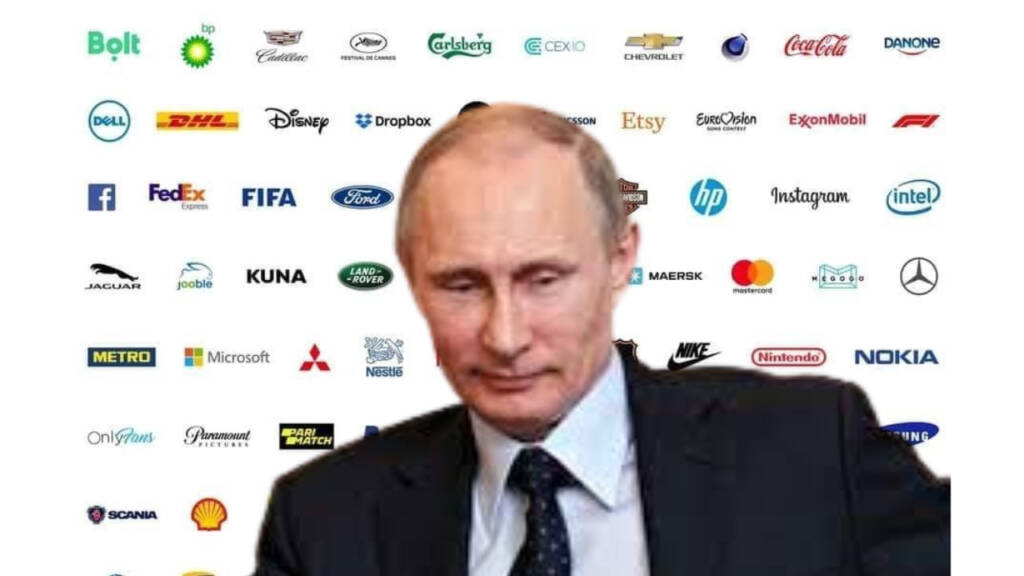In order to demonstrate support for Ukraine, Western corporations made the decision to pull out of Russia when the war in Ukraine started.
At that time, concerns were raised that these corporations’ withdrawal of investments, store closures, and sales pauses in Russia could stunt the country’s economic growth. However, Russia was quite innovative; the businesses continued under entirely new names.
However, Western businesses are now voicing their displeasure as they bear the brunt of the recession that has slammed the West; and why not, a cumulative loss of $300 billion could even make billionaires cry.
According to RBC Daily, foreign companies that have halted operations in Russia or pulled out completely have incurred losses of between $200 and $240 billion since the end of February 2022.
A total of $70-90 billion was lost by firms that had left altogether from Russia on the very first day of the Ukraine war.
If the estimates are to be believed, 34% of the “large” foreign companies doing business in Russia have scaled back their operations, 15% have chosen to leave the country by selling their Russia division, and 7% have announced a complete departure without selling the company.
The report also indicated that foreign businesses operating in the oil and gas spheres, as well as the banking, automotive, and food industries, suffered the most severe losses.
A Big Setback
So, this research solidifies the claims that the European Union had anticipated back in May 2022. At that time, European banks had an idea that leaving Russia would spur more trouble for Western businesses.
On average, more than 1000 western companies left Russia, abandoning both their clients and staff. However, it is safe to say that these sudden closures have caused more problems for Western companies themselves.
Companies from the US, UK, and Germany have reportedly been hit the hardest due to the departure.
Whereas the companies most swift in leaving the country were from Finland. Reportedly, 80% of Finnish businesses decided to withdraw from Russia, followed by Denmark (73%) and the UK (35%).
However, businesses from Austria, Japan, and Switzerland were “more flexible and pragmatic” in their decisions. Furthermore, Polish businesses have smartly stayed in Russia despite the harsh rhetoric of the country’s authorities.
Read More: Cheap food, cheap energy and abundant jobs; Western sanctions turn the fortunes around for Russians
A Reassessment now!!
It’s not like Western companies didn’t anticipate what may occur if they even scaled back their operations in Russia.
Adidas, the German sportswear giant, issued a warning in March that the closing of all of its 500 stores in Russia would have a greater impact on its sales than anticipated. The business issued a warning that it might put revenues of up to 250 million euros at risk.
Furthermore, when foreign businesses were packing their bags to leave Russia, Manfred Knopf, chief executive officer of Commerzbank, argued that shutting down operations in the face of western sanctions wouldn’t be a wise move for corporations that make a lot of money.
And now, here we are. Exactly as the CEO’s prediction that “Corporate insolvencies in markets will undoubtedly rise.” Businesses are feeling the effects of the recession, and the future of business likewise appears bleak.
However, Russia, which was eventually in the crosshairs of the West’s nefarious attempt, isn’t even bothered about the departure of Western business.
As a result of closed businesses, Russians started establishing their own alternative business chains. For instance, when McDonald’s chose to stop operating in Russia, the Russians opened Uncle Vanya’s as a McDonald’s replacement.
Read More: How Biden helped Russia strengthen the Ruble to become the best-performing currency
The world’s best-performing currency at the moment is the Russian ruble, which has mostly recovered from its losses. The Ruble has returned to its pre-war levels, but the dollar is under the weather.
The West believed that cutting all economic links with Russia would be a masterstroke to totally shut down the alleged “war machinery.” The complete opposite, however, has occurred in this instance.
The financial fallout of the conflict is quite significant for most multinationals.
